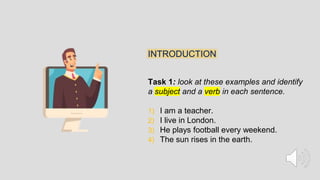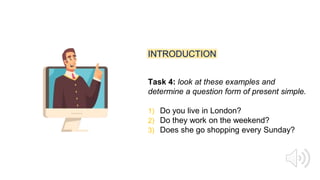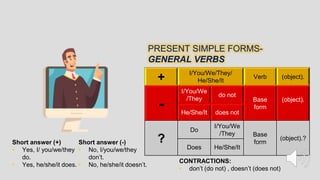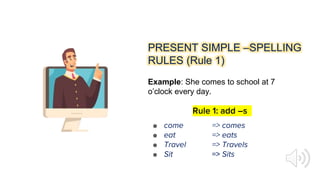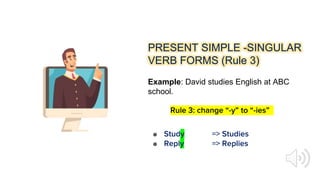Learn English Tense: Present Simple
- 1. I am drink coffee every day.
- 2. COMMON MISTAKES I am drink coffee every day. I drink coffee every day.
- 4. CONTENTS
- 5. INTRODUCTION Task 1: look at these examples and identify a subject and a verb in each sentence. 1) I am a teacher. 2) I live in London. 3) He plays football every weekend. 4) The sun rises in the earth.
- 6. TASK 1 ANSWER Subject Verb Others I am a teacher. I live in London. He plays Football every weekend. The sun rises in the earth.
- 7. INTRODUCTION Task 2: look at these examples and tell which each sentence is about facts, routines/habits, something thatŌĆÖs always true. 1) I am a teacher. 2) I live in London. 3) He plays football every weekend. 4) The sun rises in the earth.
- 8. TASK 2 ANSWER Sentence Usage 1) I am a teacher. Facts 2) I live in London. Facts 3) He plays football every weekend. Routines/habits 4) The sun rises in the earth. Soemthing that is always true.
- 9. WHEN TO USE PRESENT SIMPLE PRESENT SIMPLE Facts Routines Habits Something that is always true
- 10. INTRODUCTION Task 3: look at these examples and determine the form of negative sentences. 1) I donŌĆÖt live in London now. 2) They donŌĆÖt work at the weekend. 3) She doesnŌĆÖt play football.
- 11. INTRODUCTION Task 4: look at these examples and determine a question form of present simple. 1) Do you live in London? 2) Do they work on the weekend? 3) Does she go shopping every Sunday?
- 12. PRESENT SIMPLE FORMS- GENERAL VERBS + I/You/We/They/ He/She/It Verb (object). - I/You/We /They do not Base form (object). He/She/It does not ? Do I/You/We /They Base form (object).? Does He/She/It CONTRACTIONS: ŌĆó donŌĆÖt (do not) , doesnŌĆÖt (does not) Short answer (+) ŌĆó Yes, I/ you/we/they do. ŌĆó Yes, he/she/it does. Short answer (-) ŌĆó No, I/you/we/they donŌĆÖt. ŌĆó No, he/she/it doesnŌĆÖt.
- 13. PRESENT SIMPLE FORMS -ŌĆ£TO BEŌĆØ + I am ŌĆó noun ŌĆó prepositional phrase. ŌĆó adjective. You/ We/ They are He/She/It is CONTRACTIONS: ŌĆó IŌĆÖm ( I am) ŌĆó YouŌĆÖre (You are) ŌĆó WeŌĆÖre (We are) ŌĆó TheyŌĆÖre (They are) ŌĆó HeŌĆÖs ( He is) ŌĆó SheŌĆÖs (She is) ŌĆó ItŌĆÖs ( It is) I am drink coffee every day. Verb I am a teacher. Noun subject subject
- 14. PRESENT SIMPLE FORMS WITH ŌĆ£TO BEŌĆØ - I am not ŌĆó noun ŌĆó prepositional phrase. ŌĆó adjective. You/ We/ They are not He/She/It is not CONTRACTIONS: ŌĆó arenŌĆÖt ( are not) ŌĆó isnŌĆÖt (is not)
- 15. PRESENT SIMPLE FORMS WITH ŌĆ£TO BEŌĆØ ? Am I ŌĆó noun? ŌĆó prepositional phrase? ŌĆó adjective? Are You/ We/ They Is He/She/It Short answer (+) ŌĆó Yes, I am. ŌĆó Yes, you/we/they are. ŌĆó Yes, he/she/it is. Short answer (-) ŌĆó No, I am not. ŌĆó No, you/we/they arenŌĆÖt. ŌĆó No, he/she/it isnŌĆÖt.
- 16. PRESENT SIMPLE ŌĆōSPELLING RULES In a positive sentence, when used after a singular noun or the 3rd person singular such as he/she/it, the verb must be singular.
- 17. PRESENT SIMPLE ŌĆōSPELLING RULES (Rule 1) Example: She comes to school at 7 oŌĆÖclock every day. Rule 1: add ŌĆōs ŌŚÅ come => comes ŌŚÅ eat => eats ŌŚÅ Travel => Travels ŌŚÅ Sit => Sits
- 18. PRESENT SIMPLE -SINGULAR VERB FORMS (Rule 2) Example: He always washes clothes on weekends. Rule 2: add ŌĆōes ŌŚÅ Watch => Watches ŌŚÅ Miss => Misses ŌŚÅ Wash => Washes ŌŚÅ Mix => Mixes ŌŚÅ Buzz => Buzzes ŌŚÅ Go => Goes
- 19. PRESENT SIMPLE -SINGULAR VERB FORMS (Rule 3) Example: David studies English at ABC school. Rule 3: change ŌĆ£-yŌĆØ to ŌĆ£-iesŌĆØ ŌŚÅ Study => Studies ŌŚÅ Reply => Replies
- 20. PRESENT SIMPLE -SINGULAR VERB FORMS (Rule 3) Rule 3 Exception ŌŚÅ Play => Plays ŌŚÅ Pay => Pays
- 21. PRESENT SIMPLE -SINGULAR VERB FORMS(Rule 4) Rule 4: Irregular verbs ŌŚÅ Have => Has
- 22. Thank you for watching. If you like this lesson, please click Like and subscribe to for new weekly lessons.
- 23. Write one thing you always do and one thing that you donŌĆÖt always do after getting up. Write your sentences in a comment below.
Editor's Notes
- #4: Hello there! Welcome back to Study English with Jan. This week weŌĆÖre going to look at English adjectives. In this lesson, weŌĆÖll focus on ŌĆōed/ing adjectives. I know itŌĆÖs still confusing for many learners when ti comes to ŌĆōed/-ing adjectives. It happened to me when I studied English as well. DonŌĆÖt worry. In this video, I will make it very simple and easy for you to understand.
- #5: Therese are what weŌĆÖll cover today. To make use of this lesson, please spend 1 minute to take a quiz at the end of this video. then you can let me know how many correct answers you get in the comments. Now letŌĆÖs get started.
- #13: Base form or root of the verb is the version of the verb without any endings┬Āsuch as ing, ed,s or ed
- #17: A suffix┬Āis a letter or group of letters added at the end of a word which makes a new word.
- #18: A suffix┬Āis a letter or group of letters added at the end of a word which makes a new word.
- #19: A suffix┬Āis a letter or group of letters added at the end of a word which makes a new word.
- #20: A suffix┬Āis a letter or group of letters added at the end of a word which makes a new word.
- #21: A suffix┬Āis a letter or group of letters added at the end of a word which makes a new word.
- #22: A suffix┬Āis a letter or group of letters added at the end of a word which makes a new word.





